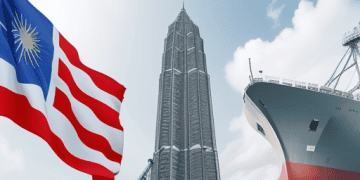Malaysia’s Ministry of Investment, Trade & Industry (MITI) has responded to the recent 10% tariff hike imposed by the United States on Malaysian exports, stating that it is taking the situation seriously while actively engaging with U.S. authorities to explore solutions that uphold fair trade principles.
MITI emphasized that Malaysia is not considering retaliatory tariffs but is instead seeking constructive engagement with the U.S. to address the tariff increase. The ministry pointed out that the new U.S. tariffs affect a wide range of countries and could have significant implications for global trade.
In response to the tariff challenge, Malaysia has approved the creation of the National Geoeconomic Command Centre (NGCC), which will assess the impact of the U.S. tariff and develop a multi-pronged strategy to mitigate its effects. The NGCC will focus on ensuring Malaysia’s economic competitiveness during these uncertain times.
The Malaysian government is also exploring trade opportunities through the Trade and Investment Framework Agreement (TIFA) and plans to pursue a Technology Safeguards Agreement with the U.S. in key sectors such as semiconductors, aerospace, and the digital economy.
Despite a U.S. trade deficit in goods with Malaysia, the U.S. enjoys a surplus in services, highlighting the strong economic ties between the two countries. U.S. companies have operated in Malaysia for decades, particularly in the electrical and electronics (E&E) sector.
MITI has made it clear that while the U.S. tariff hike presents a challenge to global trade dynamics, Malaysia remains committed to maintaining constructive trade relations with the U.S. and finding mutually beneficial solutions.
In addition, Malaysia is working to mitigate the impact by expanding its export markets, particularly in high-growth regions, and leveraging its Free Trade Agreements (FTAs), such as the Comprehensive and Progressive Agreement for Trans-Pacific Partnership (CPTPP) and the Regional Comprehensive Economic Partnership (RCEP).
The Malaysian government is also focusing on enhancing supply chain resilience by implementing key industrial policies, including the New Industrial Master Plan 2030 (NIMP 2030) and the National Energy Transition Roadmap (NETR).
MITI has pledged to continue engaging with affected industries and exploring support programs to help businesses adapt to the evolving trade landscape. The ministry remains committed to open dialogue and collaboration to resolve trade disputes and promote mutual economic prosperity.
Catch the latest in supply chain news on The Supply Chain Report. Visit ADAMftd.com for free international trade tools.
#MalaysiaTradePolicy #USTariffs #TradeRelations #TariffImpact #GlobalTrade #MalaysianEconomy #TradeNegotiations















